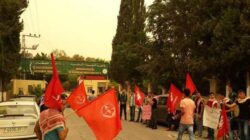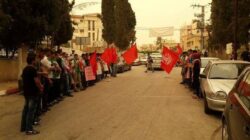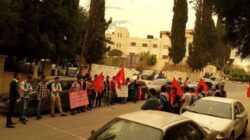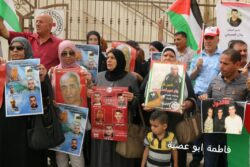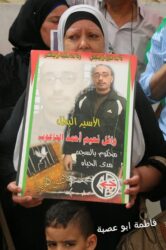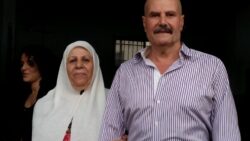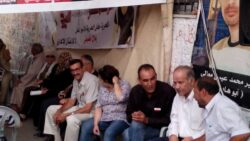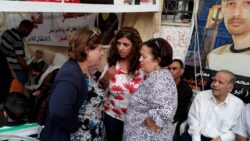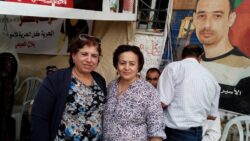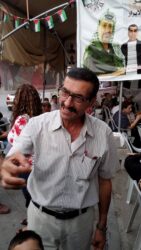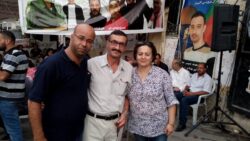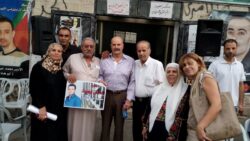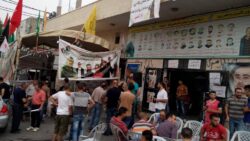An Israeli military court renewed the administrative detention of Palestinian journalist Nidal Abu Aker for an additional three months on Thursday 10 September. Abu Aker, a Palestinian refugee who lives in Dheisheh refugee camp, has been on hunger strike for the past 21 days to protest his imprisonment without charge or trial. Nidal, 47, has been held in administrative detention since 28 June 2014; overall, he has spent 15 years in Israeli prisons, the majority of them in repeated administrative detention without charge or trial.
TAKE ACTION: Stand with Palestinian prisoners on hunger strike.
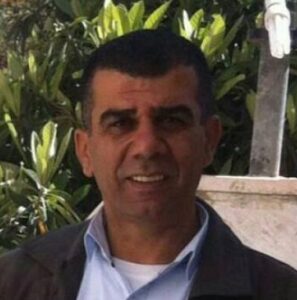
Abu Aker is striking alongside fellow administrative detainees Ghassan Zawahreh, Munir Abu Sharar, Shadi Ma’ali, and Badr al-Ruzza, all of whom launched their strike together on 20 August. They were then joined by Bilal Daoud Saifi and Suleiman Eskafi, also administrative detainees; all are demanding not only their own freedom but the end of the policy of administrative detention, the freedom of all administrative detainees, and an international commission of investigation into “secret evidence” and its use against Palestinians held in Israeli jails. Kayed Abu Rish, a fellow administrative detainee, has also re-started his hunger strike as of 2 September after a previous strike lasting over 20 days. Amir Shammas, also an administrative detainee, suspended his open hunger strike, which he began on 1 September, on 10 September after he was informed by Israeli intelligence that his administrative detention would not be renewed.
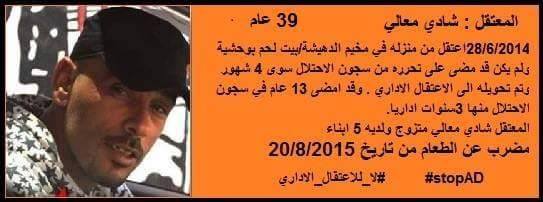
There are currently approximately 480 Palestinian prisoners held in Israeli jails under administrative detention, without charge or trial. Administrative detention orders are issued on the basis of secret evidence, denied to both the detainee and his or her lawyer, for periods of one to six months and are indefinitely renewable. The practice was introduced in Palestine by British colonizers and has been maintained since then by the Zionist colonizers who followed.
Abu Aker, who suffers from high blood pressure and ulcers, and has lost 10 kilograms since his strike began, has been repeatedly transferred from ito isolation cell within Israeli prisons in the past several days: from Kedar prison to Ramle prison to Asqelan and now to Ella prison. All of these transfers are carried out in a form of transport called the “Bosta,” a metal van with a metal chair in the back, to which the Palestinian detainee is shackled as he or she is transported. The process is lengthy; the Bosta is hot and dangerous, especially for a person who has not eaten for the past twenty days. Yet with conscious disregard for his life and health, and in an attempt to pressure him to end his strike, Abu Aker has been transported via Bosta daily for the past several days and has remained in isolation the entire time.
In fact, Palestinian lawyer Yousef Nasasreh went to visit Abu Aker in Asqelan, to be informed that he had been transfered to the Negev prison in the Naqab desert. When Nasasreh arrived at the Negev prison, he was informed that Abu Aker was instead at Ela, denying him the opportunity for a visit with his lawyer. Fellow strikers Badr al-Ruzza and Munir Abu Sharar were denied legal visits as well, while Suleiman Eskafi’s legal isit was delayed for five hours.
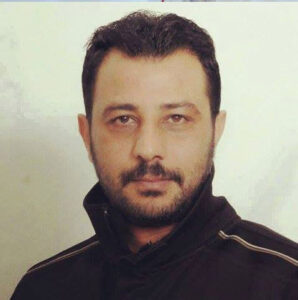
Fellow striker Ghassan Zawahreh has also been transported to isolation cells in Eshel prison, as part of the same campaign of harassment via abusive transfers. Zawahreh, detained since 8 April 2014 without charge or trial, has had his detention renewed four times. He has lost a significant aount of weight and is fatigued from his strike and the constant movements and transfers. In a message from prison, he reconfirmed his commitment to the strike and the campaign to end administrative detention, saying his morale is high and he is “confident in the inevitability of victory over the jailer.”
Organizing has continued throughout Palestine to support the strikers, with protests in Nablus, Palestine Technical University in Tulkarem, Gaza, and Bethlehem demanding their freedom. The solidarity tent with the strikers set up at the entrance of Dheisheh refugee camp has been filled daily with supporters, including Palestinian writer and former administrative detainee Ahmad Qatamesh, Abla Sa’adat, women’s activist and the wife of imprisoned Popular Front for the Liberation of Palestine General Secretary Ahmad Sa’adat; Sumoud Sa’adat, prisoner advocate and the daughter of Sa’adat; writer and former administrative detainee Wissam Rafeedie; and a delegation from the Union of Palestinian Women’s Committees visited the tent to broader action to support the striking prisoners in the “Battle of Breaking the Chains” and demand their freedom.
Samidoun Palestinian Prisoner Solidarity Network expresses its strongest solidarity with the striking prisoners, and calls for international actions, mobilizations and events to demand their freedom. We cannot wait until these brave strugglers are facing death to act and demand not only their freedom as individuals, but the abolition of administrative detention – on the road to freeing every Palestinian prisoner held in Israeli occupation jails. It is not the case that Israeli military courts are any more legitimate, fair or acceptable than administrative detention – they are just as arbitrary, racist and illegitimate. But administrative detention is a weapon of mass terror used against the Palestinian people, and it is critical to bring this practice to an end. These Palestinian prisoners have put their bodies on the line in order to end administrative detention – and it is imperative that we act to support them. These prisoners’ struggle is not only about their individual freedom – it is part of their struggle for return and liberation for Palestine.
1. Sign on to this statement in support of the prisoners’ demand to End Administrative Detention. Organizational and individual endorsements are welcome – and organizational endorsements particularly critical – in support of the prisoners’ demands and their actions. Click here to sign or sign below:http://bit.ly/EndAdministrativeDetention
2. Send a solidarity statement. The support of people around the world helps to inform people about the struggle of Palestinian prisoners. It is a morale booster and helps to build political solidarity. Please send your solidarity statements to samidoun@samidoun.net. They will be published and sent directly to the prisoners.
3. Hold a solidarity one-day hunger strike in your area. Gather in a tent or central area, bring materials about Palestinian prisoners and hold a one-day solidarity strike to raise awareness and provide support for the struggle of the prisoners and the Palestinian cause. Please email us at samidoun@samidoun.net to inform us of your action – we will publicize and share news with the prisoners.
4. Protest at the Israeli consulate or embassy in your area. Bring posters and flyers about administrative detention and Palestinian hunger strikers and hold a protest, or join a protest with this important information. Hold a community event or discussion, or include this issue in your next event about Palestine and social justice. Please email us at samidoun@samidoun.net to inform us of your action – we will publicize and share news with the prisoners.
5. Contact political officials in your country – members of Parliament or Congress, or the Ministry/Department of Foreign Affairs or State – and demand that they cut aid and relations with Israel on the basis of its apartheid practices, its practice of colonialism, and its numerous violations of Palestinian rights including the systematic practice of administrative detention. Demand they pressure Israel to free the hunger strikers and end administrative detention.
6. Boycott, Divest and Sanction. Hold Israel accountable for its violations of international law. Don’t buy Israeli goods, and campaign to end investments in corporations that profit from the occupation. G4S, a global security corporation, is heavily involved in providing services to Israeli prisons that jail Palestinian political prisoners – there is a global call to boycott it. Palestinian political prisoners have issued a specific call urging action on G4S. Learn more about BDS at bdsmovement.net.
Discover more from Samidoun: Palestinian Prisoner Solidarity Network
Subscribe to get the latest posts sent to your email.

